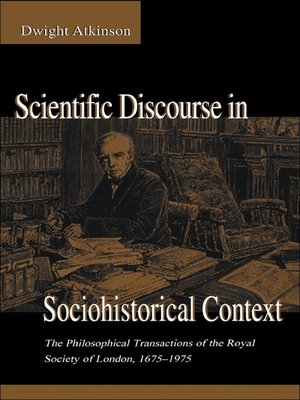Scientific Discourse in Sociohistorical Context
ebook ∣ The Philosophical Transactions of the Royal Society of London, 1675-1975 · Rhetoric, Knowledge, and Society Series
By Dwight Atkinson

Sign up to save your library
With an OverDrive account, you can save your favorite libraries for at-a-glance information about availability. Find out more about OverDrive accounts.
Find this title in Libby, the library reading app by OverDrive.



Search for a digital library with this title
Title found at these libraries:
| Library Name | Distance |
|---|---|
| Loading... |
Scientific Discourse in Sociohistorical Context represents the intersection of knowledge and method, examined from the perspective of three distinct disciplines: linguistics, rhetoric-composition, and history. Herein, Dwight Atkinson describes the written language and rhetoric of the Royal Society of London, based on his analysis of its affiliated journal, The Philosophical Transactions, starting with the 17th century advent of modern empirical science through to the present day. Atkinson adopts two independent approaches to the analysis of written discourse—from the fields of linguistics and rhetoric-composition—and then integrates and interprets his findings in light of the history of the Royal Society and British science.
Atkinson's study provides the most complete and particular institutional account of a scientific journal, which in this case is a publication that stands as an icon of scientific publication. He supplies his readers with important material found nowhere else in the historical literature, including details about the operation of the journal and its relation to the society. The work embeds the history of the journal and its editors within the history of the Royal Society and other developments in science and society. The synthesis of historical, linguistic, rhetorical, and cultural analysis makes visible certain complex communicative dynamics that could not previously be seen from a single vantage point.
The work presented here reinforces how deep historical examinations of linguistic and rhetorical practices have direct bearing on how and what scholars read and write now. Most significantly, this volume demonstrates how these historical activities need to inform current teaching of and thinking about language.







